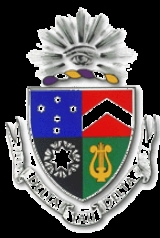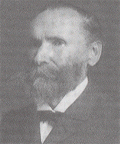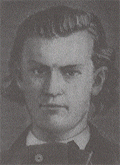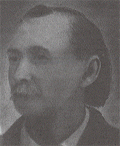
Delta Tau Delta
Encyclopedia
Delta Tau Delta is a U.S.
-based international secret letter college fraternity
. Delta Tau Delta was founded in 1858 at Bethany College
, Bethany, Virginia
, (now West Virginia
). It currently has around 125 student chapters nationwide, as well as more than 25 regional alumni groups. Its national community service initiative is Adopt-a-School. The fraternity celebrated its 150th anniversary in Pittsburgh, Pennsylvania
, at the 2008 Karnea (international convention).
in Bethany, Virginia
(now West Virginia). The social life on campus was typical of the small colleges of the day, with activities centered around the Neotrophian Society, a literary society. The Delta Tau Delta Founders House
was listed on the National Register of Historic Places
in 1979.
According to Jacob S. Lowe written in 1859, in late 1858 a group of students met in Lowe's room in the Dowdell boarding house to discuss means to regain control of the Neotrophian Society and return control to the students at large. The underlying controversy was that the Neotrophian Society, in the estimation of the eight men who formed Delta Tau Delta, had awarded a literary prize after a rigged vote. A constitution, name, badge, ritual and motto were devised, and Delta Tau Delta was born.
Important in the early history of Delta Tau Delta was the initiation of two men, Rhodes Stansbury Sutton (Stan for short) and Samuel S. Brown, into the fraternity. Henry King Bell who was located in Lexington, Kentucky, heard of the Civil War's effects on Bethany College and the membership of Delta Tau Delta. After riding to Bethany and realizing that the longevity of Delta Tau Delta at risk, Bell travelled to Canonsburg, Pennsylvania and found two men of distinction: Sutton and Brown. On February 22, 1861 they rode on horseback during a snowstorm of mythic proportions, with roads nearly impassable, from what was then Jefferson College (would later merge with Washington Academy to become the present day Washington & Jefferson College) in Canonsburg, Pennsylvania to Bethany to be initiated and bring the designation of the Alpha Chapter and the governance of the Fraternity back to their home campus. . As membership declined at the Jefferson Alpha Chapter, Jefferson College faced an uncertain merger with Washington Academy. In fact, the Jefferson College was going out of existence and its campus was being moved to Washington, Pennsylvania. Uncertain as to the stability and success of this merger, the men at Jefferson did the responsible thing by allowing the election of a new Alpha Chapter at the General Convention (later to be renamed the Karnea). Ohio Wesleyan then assumed the Alpha designation. Before the Alpha designation was finally transferred to Allegheny College
(its current location), the Ohio Wesleyan chapter disappeared temporarily because of a lack of membership.
In 1886, Delta Tau Delta merged with the Rainbow Fraternity, a southern fraternity founded in 1848 at the University of Mississippi
. This was in response to Delta Tau Delta's declining number of chapters in the South.
After the Ohio Wesleyan chapter disappeared in 1875, Allegheny College
chapter, the fourth and final chapter to hold Alpha designation, assumed control of the Fraternity. James S. Eaton, Alpha (Allegheny College
) 1875, a “hero” of the Fraternity, traveled to Delaware, Ohio, to collect what remained of the organization’s records he could find. After discovering what little he could about the loss of the Ohio Wesleyan members, he brought the “Alpha” designation back with him to Allegheny College
. There, a well-managed group of undergraduates handled their own chapter affairs as well as the supervision of the whole Fraternity. Delta Tau Delta flourished during Allegheny's era of control; a magazine was established; 15 chapters were founded, of which eight survive (several others were reestablished later).
Delta Tau Delta now has 134 undergraduate chapters and colonies, more than 6,800 active undergraduates, more than 115,000 living alumni, and has initiated more than 157,000 members since its founding.
Members of Delta Tau Delta are collectively known as "Delts".
United States
The United States of America is a federal constitutional republic comprising fifty states and a federal district...
-based international secret letter college fraternity
Fraternities and sororities
Fraternities and sororities are fraternal social organizations for undergraduate students. In Latin, the term refers mainly to such organizations at colleges and universities in the United States, although it is also applied to analogous European groups also known as corporations...
. Delta Tau Delta was founded in 1858 at Bethany College
Bethany College (West Virginia)
Bethany College is a private liberal arts college located in Bethany, West Virginia, United States. Founded in 1840, Bethany is the oldest institution of Higher Education in West Virginia.-Location:...
, Bethany, Virginia
Bethany, West Virginia
Bethany is a town in Brooke County, West Virginia, United States. It is part of the Weirton–Steubenville, WV-OH Metropolitan Statistical Area. The population was 985 at the 2000 census. The Town of Bethany is home to Bethany College.-History:...
, (now West Virginia
West Virginia
West Virginia is a state in the Appalachian and Southeastern regions of the United States, bordered by Virginia to the southeast, Kentucky to the southwest, Ohio to the northwest, Pennsylvania to the northeast and Maryland to the east...
). It currently has around 125 student chapters nationwide, as well as more than 25 regional alumni groups. Its national community service initiative is Adopt-a-School. The fraternity celebrated its 150th anniversary in Pittsburgh, Pennsylvania
Pittsburgh, Pennsylvania
Pittsburgh is the second-largest city in the US Commonwealth of Pennsylvania and the county seat of Allegheny County. Regionally, it anchors the largest urban area of Appalachia and the Ohio River Valley, and nationally, it is the 22nd-largest urban area in the United States...
, at the 2008 Karnea (international convention).
History
Delta Tau Delta Fraternity was founded in 1858 at Bethany CollegeBethany College (West Virginia)
Bethany College is a private liberal arts college located in Bethany, West Virginia, United States. Founded in 1840, Bethany is the oldest institution of Higher Education in West Virginia.-Location:...
in Bethany, Virginia
Bethany, West Virginia
Bethany is a town in Brooke County, West Virginia, United States. It is part of the Weirton–Steubenville, WV-OH Metropolitan Statistical Area. The population was 985 at the 2000 census. The Town of Bethany is home to Bethany College.-History:...
(now West Virginia). The social life on campus was typical of the small colleges of the day, with activities centered around the Neotrophian Society, a literary society. The Delta Tau Delta Founders House
Delta Tau Delta Founders House
Delta Tau Delta Founders House is a historic home associated with Bethany College, at Bethany, Brooke County, West Virginia. It was built in the early 1850s, and is a two story, five bay Greek Revival-style dwelling. It is "L"-shaped and constructed of brick on a limestone foundation...
was listed on the National Register of Historic Places
National Register of Historic Places
The National Register of Historic Places is the United States government's official list of districts, sites, buildings, structures, and objects deemed worthy of preservation...
in 1979.
According to Jacob S. Lowe written in 1859, in late 1858 a group of students met in Lowe's room in the Dowdell boarding house to discuss means to regain control of the Neotrophian Society and return control to the students at large. The underlying controversy was that the Neotrophian Society, in the estimation of the eight men who formed Delta Tau Delta, had awarded a literary prize after a rigged vote. A constitution, name, badge, ritual and motto were devised, and Delta Tau Delta was born.
Important in the early history of Delta Tau Delta was the initiation of two men, Rhodes Stansbury Sutton (Stan for short) and Samuel S. Brown, into the fraternity. Henry King Bell who was located in Lexington, Kentucky, heard of the Civil War's effects on Bethany College and the membership of Delta Tau Delta. After riding to Bethany and realizing that the longevity of Delta Tau Delta at risk, Bell travelled to Canonsburg, Pennsylvania and found two men of distinction: Sutton and Brown. On February 22, 1861 they rode on horseback during a snowstorm of mythic proportions, with roads nearly impassable, from what was then Jefferson College (would later merge with Washington Academy to become the present day Washington & Jefferson College) in Canonsburg, Pennsylvania to Bethany to be initiated and bring the designation of the Alpha Chapter and the governance of the Fraternity back to their home campus. . As membership declined at the Jefferson Alpha Chapter, Jefferson College faced an uncertain merger with Washington Academy. In fact, the Jefferson College was going out of existence and its campus was being moved to Washington, Pennsylvania. Uncertain as to the stability and success of this merger, the men at Jefferson did the responsible thing by allowing the election of a new Alpha Chapter at the General Convention (later to be renamed the Karnea). Ohio Wesleyan then assumed the Alpha designation. Before the Alpha designation was finally transferred to Allegheny College
Allegheny College
Allegheny College is a private liberal arts college located in northwestern Pennsylvania in the town of Meadville. Founded in 1815, the college has about 2,100 undergraduate students.-Early history:...
(its current location), the Ohio Wesleyan chapter disappeared temporarily because of a lack of membership.
In 1886, Delta Tau Delta merged with the Rainbow Fraternity, a southern fraternity founded in 1848 at the University of Mississippi
University of Mississippi
The University of Mississippi, also known as Ole Miss, is a public, coeducational research university located in Oxford, Mississippi. Founded in 1844, the school is composed of the main campus in Oxford, four branch campuses located in Booneville, Grenada, Tupelo, and Southaven as well as the...
. This was in response to Delta Tau Delta's declining number of chapters in the South.
After the Ohio Wesleyan chapter disappeared in 1875, Allegheny College
Allegheny College
Allegheny College is a private liberal arts college located in northwestern Pennsylvania in the town of Meadville. Founded in 1815, the college has about 2,100 undergraduate students.-Early history:...
chapter, the fourth and final chapter to hold Alpha designation, assumed control of the Fraternity. James S. Eaton, Alpha (Allegheny College
Allegheny College
Allegheny College is a private liberal arts college located in northwestern Pennsylvania in the town of Meadville. Founded in 1815, the college has about 2,100 undergraduate students.-Early history:...
) 1875, a “hero” of the Fraternity, traveled to Delaware, Ohio, to collect what remained of the organization’s records he could find. After discovering what little he could about the loss of the Ohio Wesleyan members, he brought the “Alpha” designation back with him to Allegheny College
Allegheny College
Allegheny College is a private liberal arts college located in northwestern Pennsylvania in the town of Meadville. Founded in 1815, the college has about 2,100 undergraduate students.-Early history:...
. There, a well-managed group of undergraduates handled their own chapter affairs as well as the supervision of the whole Fraternity. Delta Tau Delta flourished during Allegheny's era of control; a magazine was established; 15 chapters were founded, of which eight survive (several others were reestablished later).
Delta Tau Delta now has 134 undergraduate chapters and colonies, more than 6,800 active undergraduates, more than 115,000 living alumni, and has initiated more than 157,000 members since its founding.
Members of Delta Tau Delta are collectively known as "Delts".
Founders
The eight men considered to be the Founders of the Delta Tau Delta fraternity are: |
William Randolph Cunningham (Chair) | William Randolph Cunningham was only a freshman at the time Delta Tau Delta was formed. Because he was older and had become a Mason, however, he exerted much influence in the group. Cunningham, the picture of integrity, was probably responsible for much of the early language in both the Constitution and Ritual. He served as President of the Karnea in 1883. He was also a minister and held public office in the state of Washington. |
 |
Alexander Campbell Earle | Alexander Campbell Earle, the youngest of the group of eight founders of Delta Tau Delta, went on to become a Captain in the Second South Carolina Volunteers, where he commanded his own company. For many years his whereabouts were unknown and he was believed dead, but he was finally located living in Arkansas. He later moved to Texas, and is buried in the State Cemetery in Austin, where the local fraternity still makes an annual pilgrimage. |
 |
Richard Havener Alfred | Richard Havener Alfred, at 26 the oldest of the group of founders of Delta Tau Delta, became a minister and a physician. |
 |
Henry King Bell | Henry King Bell, a Kentuckian, lived only six years after graduation. His contribution to the Fraternity was immense; without him, there would be no Delta Tau Delta today. Bell responded to a call for help from the last remaining members of the Bethany chapter who were leaving to join the armed forces. |
 |
John Calhoun Johnson | John Johnson became a lawyer and politician. He was the political advisor to John W. Davis, the democratic candidate for president in 1924. One of Johnson's favorite pastimes was conducting tours of Bethany and pointing out the room where Delta Tau Delta was founded. He outlived the other founders by eight years. |
 |
Jacob Snedeker Lowe | Jacob Lowe hosted the first meetings of the group in a rooming house which has now become an international shrine for the Fraternity. Lowe became a professor and later a college president. |
 |
Eugene Tarr | Eugene Tarr was a "townie" whose home was only a short six miles from Bethany. He stayed in West Virginia after college. Tarr became a noted speaker, lawyer, and editor of the local newspaper. |
 |
John Lucius Newton Hunt | John Lucius Newton Hunt was the scholar of the group. After graduating from Bethany, Hunt went on to become the valedictorian of his class at New York University's School of Law. He then served for several years as New York's Commissioner of Education. |

